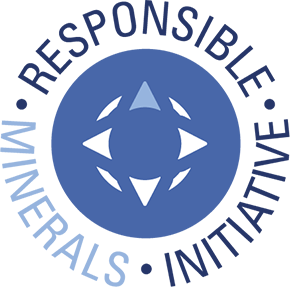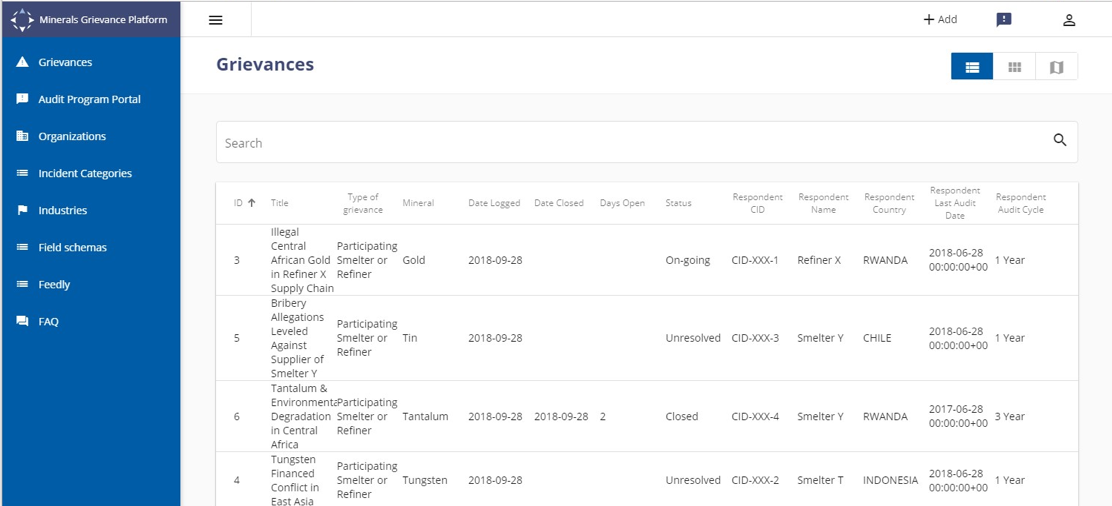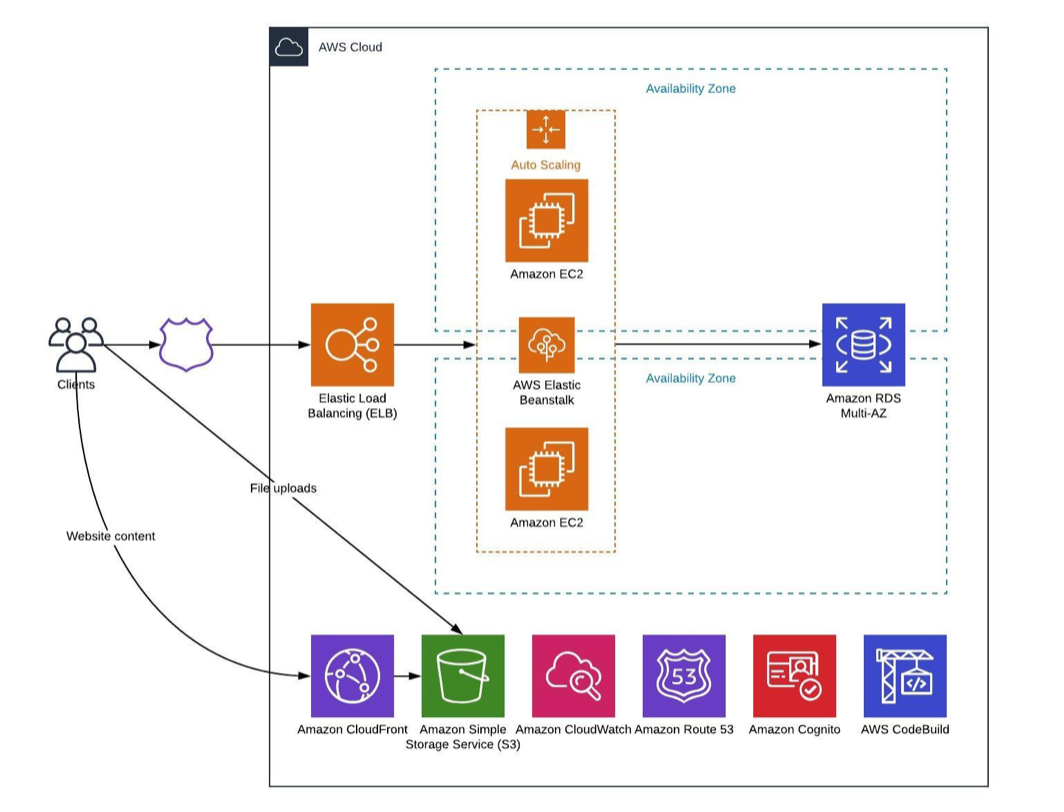RMI Builds a Custom Solution on Grievances Linked to Risks of Conflict, Human Rights Violations in the Mineral Sector

Challenge
RMI sought to build a user platform with multi-tier access control, stringent data security, and more.
Solution
ClearScale designed a custom platform using the Angular web framework that had two parts: a user interface and a Java application with several AWS features, including Amazon RDS PostgreSQL and S3.
Benefits
Today, many organizations use RMI’s Minerals Grievance Platform, which is secure and accessible through any web browser.
AWS Services
Amazon Cognito, Amazon RDS PostgreSQL, Amazon S3
Executive Summary
Sustainability isn’t just a buzzword: for many companies we work with, it’s an ethos that permeates throughout their entire product lineup. Manufacturing products from smartphones to cars requires a robust supply of natural resources, such as rare metals and so-called conflict minerals that are mined all over the globe. Throughout the world, and especially in the conflict-affected and high-risk areas, producing these valuable resources is associated with risks, sometimes surfacing illegal, unethical, and dangerous business practices that can threaten the safety of workers, the environment, and the companies themselves.
The Responsible Minerals Initiative (RMI) was founded to specifically address concerns related to the responsible and sustainable sourcing of minerals throughout the globe. Across a wide range of industries, the RMI has grown into one of the world’s most utilized and respected resources for companies seeking to make informed choices about how their mineral resources are sourced and managed. The RMI, in collaboration with London Bullion Market Association (LBMA) and Responsible Jewelry Council (RJC), is leading the development of an online cross-industry platform to screen and address grievances linked to smelters and refiners present in global supply chains. By sharing crucial information with the participating member companies, organizations can make sure that their due diligence processes are working well, that there are systems in place to source minerals and metals responsibly. Furthermore, there is an expectation that risks, negative impacts, and/or grievances arising within the mineral supply chains related to human rights violations, conflict, and other critical risks as detailed in the OECD Due Diligence Guidance for Responsible Supply Chains of Minerals from Conflict-Affected and High-Risk Areas (OECD Guidance) Annex II will get identified and addressed.
The Challenge
Companies face several challenges when it comes to addressing risks in mineral supply chains:
- Evolving expectations for enhanced due diligence in mineral supply chains
- Need for coordination across industry initiatives’ assessment programs on grievances
- Growing desire for transparency around industry efforts to proactively address grievances, driving towards better mitigation
As part of RMI’s tools and resources to support supply chain due diligence, the RMI sought to create a collaborative platform to help its members and stakeholders identify, review, and resolve mineral sector grievances, with the ultimate goal of increasing awareness and developing a common understanding of supply chain grievances as well as driving credible, documented grievance resolution.
The purpose of the platform is to create a connected and efficient grievance review system that benefits a wide range of stakeholders and builds on existing mechanisms. The platform will provide a record and a communication channel for identification, review, and resolution of grievances. The platform addresses the OECD Due Diligence Guidance Step 1 requirement for company or industry grievance mechanism, and aims to complement smelter and refiner assessments (OECD Step 4) as a grievance mechanism supplementary to the “red flag” review and risk assessment in accordance with Steps 2 and 3 of the OECD Due Diligence Guidance.
Designing and implementing a platform to track grievances presented a number of challenges, including ensuring comprehensive data security, multi-tier access control, and the ability to collaboratively track and process grievances from different stakeholders. The platform also required a solution for clear and easy collaboration between multiple users who have different roles and different levels of access within the platform, such as audit programs like RMI, independent platform manager/analyst, participating downstream companies, and smelters or refiners. It needed to be password protected for confidentiality and privacy concerns, and required a public-facing element where progress would be reported for the benefit of NGOs, other key stakeholders, and non-participating companies, and where any supply chain actor would be able to submit any potential grievances for review.
The ClearScale Solution
The RMI approached ClearScale, an AWS Premier Partner, to build a custom solution to collect, track, and process mineral sector grievances. Created using the Angular web framework, ClearScale designed the Minerals Grievance Platform as a custom web application to handle the logic of grievance processing and access controls. To ensure the physical safety of data, AWS was chosen to host the project.
For greater usability and high data security, ClearScale conceptually split the application into two parts: a responsive, browser-based web user interface, and a back-end Java application running on AWS. The web UI, built using the Angular web framework, uses Material Design to provide a consistent user experience on both desktop browsers and mobile devices. Both parts of the application communicate over a secure channel via a REST API.
A sample list of dummy grievances from the platform Demo site

One of the RMI’s greatest security priorities was user authentication and data security. To defend against password hacking attacks and to handle authentication and user management, ClearScale incorporated AWS Cognito, which provides secure storage for user information with robust defenses against hacking attempts. ClearScale also incorporated an additional layer of access control using web application framework to ensure that clients can only see the data they have permission to view through each API request.
In order to protect the grievance data securely, the portal relies on Amazon RDS PostgreSQL and Amazon S3 for storing file attachments. Each service provides elaborate security measures, including encryption at rest and encryption in transit. Additionally, ClearScale added an audit layer to track all changes to database entities in order to provide an audit trail of any given grievance.
Architecture Diagram

The Benefits
At RMI’s 2018 annual industry conference, stakeholders received a live demonstration of the Minerals Grievance Platform, slated for release in the summer of 2019. The project currently makes it possible to track and review grievances throughout their entire lifecycle, from submission to resolution, empowering companies to ensure grievances are addressed in an efficient, collaborative, thorough, and transparent manner.
With ClearScale’s assistance, organizations using the Minerals Grievance Platform can now address important issues with ease through any web browser. These organizations can also rely on industry-leading data security standards employed by AWS, entrusting confidential and critical information in a platform with multiple layers of authentication and security. By carefully controlling access to information sent through the portal, the Responsible Minerals Initiative can help ensure the safety of those submitting anonymous claims, ensuring that whistleblowers and other targets of potential retribution have a protected platform from which to shed light on supply chain risks, including, for example, egregious human rights abuses.